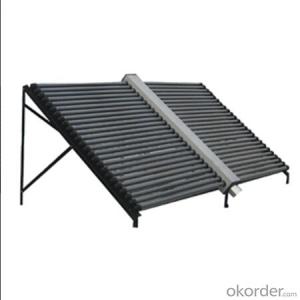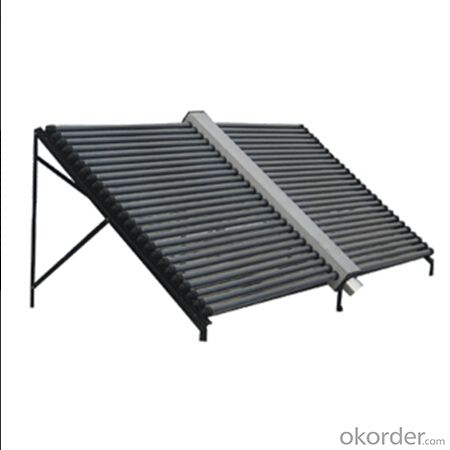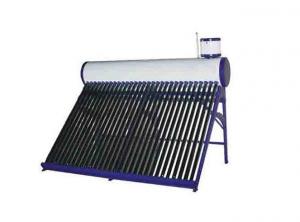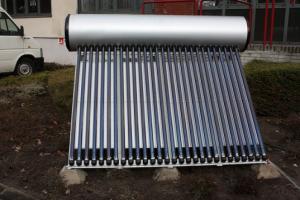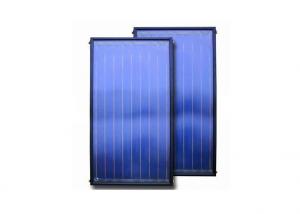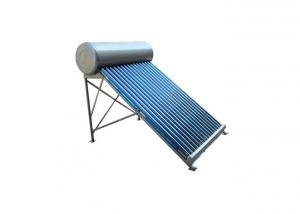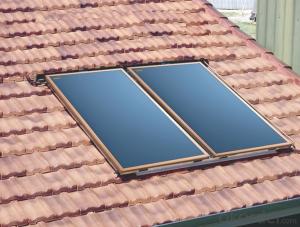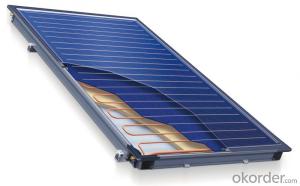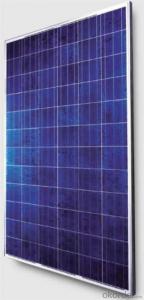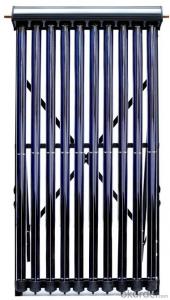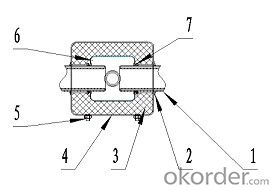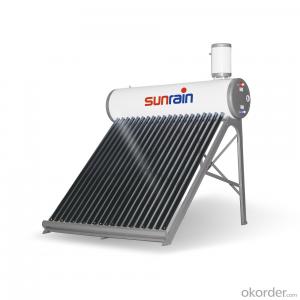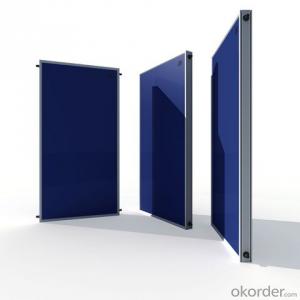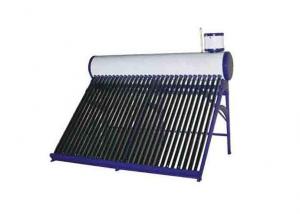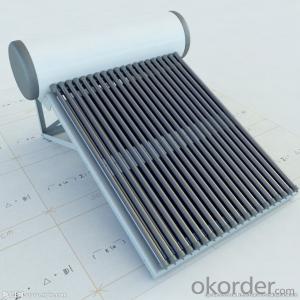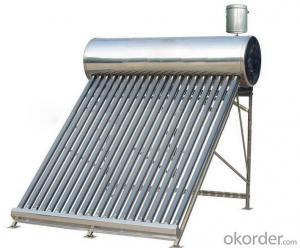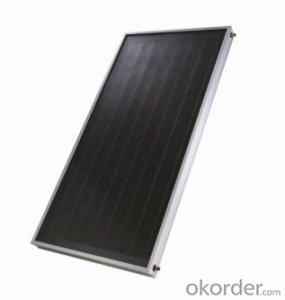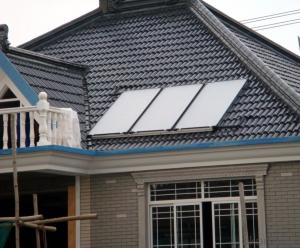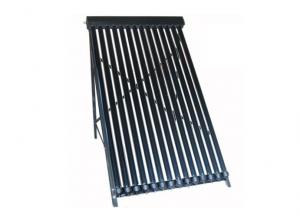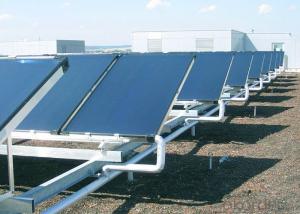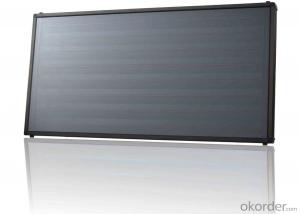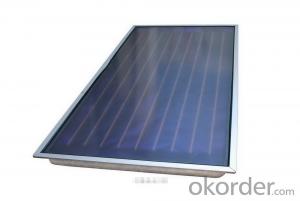Low Temperature Solar Collectors - No-Pressurized Solar Collector Model SC-V
- Loading Port:
- Shanghai
- Payment Terms:
- TT or LC
- Min Order Qty:
- 100 set
- Supply Capability:
- 500 set/month
OKorder Service Pledge
OKorder Financial Service
You Might Also Like
1. Structure of Solar Project No-pressurized Solar Collector Model SC-V
This kind of solar collector is designed for commercial buildings,Suitable for schools, dormitories, hotels, bath centers and other public constructions as well.
It is composed by the following parts:

1.vacuum tube 2.dustproof rubber 3.polyurethane insulation 4.casing 5.fixed bolt 6.inner tank 7. nozzle seal ring |
|
2. Main Features of Solar Project No-pressurized Solar Collector Model SC-V
Food grade SUS304 inner tank, corrosion resistant for long service life.
Unpressurized, suitable for natural circulation system,in large collector area,easy to assemble and install.
Polyurethane insulation, High pressure foaming process, small heat conductivity coefficient, not easy to loss heat.
3. Solar Project No-pressurized Solar Collector Model SC-V Images
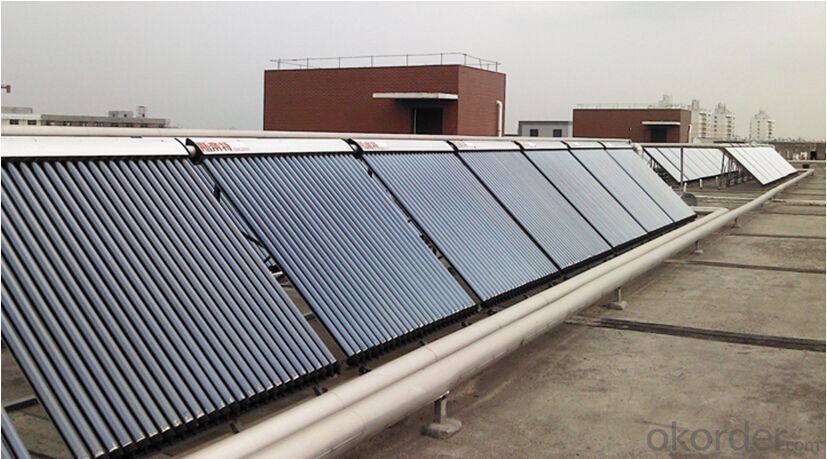
4. Solar Project No-pressurized Solar Collector Model SC-V Specification
Model | SC-V-50-II | SC-V-60-II |
Tube Qty(pcs) | 50 | 60 |
Tube Pitch(MM) | 75 | 75 |
Tube Diameter/ Length(MM) | φ58/1800 | φ58/1800 |
Vacuum Tube Material | high borosilicate glass 3.3 | high borosilicate glass 3.3 |
Thickness of Inner Tube/OuterTube(MM) | 1.6/1.8 | 1.6/1.8 |
Inner tank Material / Thickness(MM) | SUS304/0.41 | SUS304/0.41 |
Joint Specification | 1″ | 1″ |
Insulation Material/ Thickness(MM)) | Polyurethane/40 | Polyurethane/40 |
Rated Pressure(MPa) | 0.003 | 0.003 |
Working Temperature ℃ | <100 | <100 |
Capacity(L) | 145 | 175 |
Collecting Area(㎡) | 4.8 | 5.8 |
Gross Area(㎡) | 7.72 | 8.24 |
Referral Traffic(L/min) | 5.76 | 6.96 |
Intercept Efficiency η0 | 0.62 | 0.62 |
Heat Loss Coefficient a | 3.0 | 3.0 |
Collector Net Weight(kg) | 12.5 | 129.5 |
Horizontal installation size | ||
Angle | 15° | 15° |
a (㎜) | 2060 | 2435 |
b (㎜) | 1974 | 2349 |
c (㎜) | 1860 | 2335 |
d (㎜) | 2023 | 2360 |
e (㎜) | 2200 | 2550 |
f (㎜) | 770 | 860 |
G (㎜) | 3715 | 3715 |
H (㎜) | 3560 | 3560 |
H/2 (㎜) | 1780 | 1780 |
5. FAQ
(1). Are the solar collectors noticeable on the roof?
If only the collector is mounted on the roof it should blend into the roof design quite well. Our solar collectors are very thin and can be flush mounted on a roof. From a distance they look somewhat like a skylight. You may have to check with your local council regarding building restrictions when installing your solar collector.
(2). Can the solar collectors be mounted on a flat surface?
Yes they may be mounted on a flat roof or on the ground by using a stainless steel Flat Roof Frame. The collector should be installed at a minimum of 20o angle to ensure optimal heat pipe operation.
(3). How do I protect my solar system during subzero temperatures?
If you have a system that is operating in areas with subzero temperatures, freeze protection must be implemented. The easiest means of preventing freezing is to use a controller with a low temperatures setting, so when the manifold temperature drops below a certain pre-set temperature (5oC/40oF), the pump will circulate, warming the collector with water from the bottom of the storage tank. The pump will not run continually, just periodically, the frequency of which will depend on the outside temperature. In extremely cold areas, a closed loop using a glycol/water mix may be appropriate.
- Q: Can solar collectors be used in shopping malls?
- Yes, solar collectors can be used in shopping malls. They can be installed on rooftops or in open spaces around the mall to harness solar energy and generate electricity or heat water for various applications within the mall. This can help reduce energy costs, promote sustainability, and contribute to the mall's overall green initiatives.
- Q: Can solar collectors be used for heating barns?
- Yes, solar collectors can be used for heating barns. Solar collectors, such as solar water heaters or air heaters, can capture and convert sunlight into heat energy, which can then be used to warm the air or water in barns. This can provide a cost-effective and sustainable alternative to traditional heating methods for barns.
- Q: Can solar collectors be used for heating residential care facilities?
- Yes, solar collectors can be used for heating residential care facilities. Solar thermal systems can efficiently capture and convert sunlight into heat energy, which can then be used for space heating, water heating, and even heating swimming pools in residential care facilities. Implementing solar collectors can help reduce energy costs and carbon emissions, making it a sustainable and environmentally friendly solution for heating these facilities.
- Q: Are there any aesthetic considerations when installing solar collectors?
- Yes, there are aesthetic considerations when installing solar collectors. The placement of solar collectors should be carefully considered to minimize their visual impact on the overall design of the building or landscape. Installers often work to integrate the collectors into the existing architecture or landscape design, using techniques such as flush mounting, color matching, or incorporating them into building materials. Ultimately, the goal is to ensure that solar collectors blend harmoniously with the surroundings and maintain or enhance the aesthetic appeal of the property.
- Q: What is the expected energy savings from a solar collector system?
- The expected energy savings from a solar collector system can vary depending on various factors such as the size of the system, the amount of sunlight available, and the energy needs of the property. On average, solar collector systems can provide energy savings of around 50-75%, significantly reducing reliance on traditional energy sources and resulting in lower utility bills.
- Q: Can solar collectors be used for heating disaster relief areas?
- Yes, solar collectors can be used for heating disaster relief areas. They can provide a sustainable and reliable source of heat by converting sunlight into thermal energy. This can be particularly beneficial in disaster-stricken areas where traditional heating methods may be unavailable or unreliable. Solar collectors offer an environmentally friendly and cost-effective solution to provide warmth and comfort to those in need during relief efforts.
- Q: Are solar collectors suitable for heating shopping malls?
- Yes, solar collectors are suitable for heating shopping malls. They can effectively harness the sun's energy to provide heating, reducing reliance on traditional heating systems and lowering energy costs. Additionally, solar collectors are environmentally friendly, promoting sustainability and reducing carbon emissions. However, the feasibility and effectiveness of solar collectors in heating shopping malls may depend on factors such as the mall's size, location, and energy requirements.
- Q: Can solar collectors be used in off-grid applications?
- Yes, solar collectors can be used in off-grid applications. Off-grid systems are not connected to the main electrical grid and rely on alternative sources of energy, such as solar power. Solar collectors, also known as solar panels, can generate electricity by harnessing sunlight, making them a suitable and efficient solution for off-grid applications.
- Q: Can solar collectors be used in areas with limited access to financing options?
- Yes, solar collectors can be used in areas with limited access to financing options. There are various alternative funding models and initiatives available, such as government grants, community-based financing, microfinance, and solar leasing programs, which can help overcome financial barriers and make solar energy more accessible in such areas. Additionally, advancements in technology have made solar collectors more affordable and cost-effective, contributing to their viability even in areas with limited financing options.
- Q: Can solar collectors be used for heating police stations?
- Yes, solar collectors can be effectively used for heating police stations. Solar thermal systems can capture sunlight and convert it into heat energy, which can then be used for heating purposes. By installing solar collectors on the roof or grounds of police stations, the captured heat can be used to warm the building and reduce reliance on traditional heating systems, resulting in cost savings and a more sustainable operation.
Send your message to us
Low Temperature Solar Collectors - No-Pressurized Solar Collector Model SC-V
- Loading Port:
- Shanghai
- Payment Terms:
- TT or LC
- Min Order Qty:
- 100 set
- Supply Capability:
- 500 set/month
OKorder Service Pledge
OKorder Financial Service
Similar products
Hot products
Hot Searches
Related keywords
